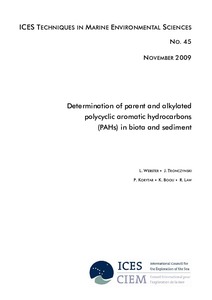Determination of parent and alkylated polycyclic aromatic hydrocarbons (PAHs) in biota and sediment.

View/
Average rating
votes
Date
2010Author
Webster, L.
Tronczynski, J.
Korytar, P.
Booij, K.
Law, R.
Status
PublishedPages
26pp.
Metadata
Show full item recordAbstract
This document provides advice on the analysis of parent and alkylated polycyclic
aromatic hydrocarbons (PAHs) in total sediment, sieved fractions, suspended
particulate matter, and biota (shellfish). The determination of parent and alkylated
PAHs in sediment and biota includes extraction with organic solvents, clean‐up, and
analysis by gas chromatography (GC) with mass spectrometry (GC‐MS). Advice is
given on the treatment and storage of samples. Extraction and clean‐up methods
commonly used are described. GC‐MS is the only recommended method for the
analysis of both parent and alkylated PAHs and advice is provided on standards and
calibration. All steps in the procedure are susceptible to insufficient recovery and/or
contamination. Quality‐control procedures are recommended to check the
performance of the method. These guidelines are intended to encourage and assist
analytical chemists to reconsider their methods critically and to improve their
procedures and/or the associ.....
Resource URL
http://ices.dk/publications/library/Publisher
International Council for the Exploration of the Sea (ICES)Copenhagen, Denmark
Series;Nr
ICES Techniques in Marine Environmental Sciences;45Document Language
enSustainable Development Goals (SDG)
14.1Best Practice Type
Standard Operating ProcedureGuide
ISSN
0903–2606Citation
Webster, L.; Tronczynski. J.; Korytar. P.; Booij, K. and Law, R. (2010) Determination of parent and alkylated polycyclic aromatic hydrocarbons (PAHs) in biota and sediment. ICES Techniques in Marine Environmental Sciences, No. 45, 26pp. DOI: http://dx.doi.org/10.25607/OBP-232Collections
 Repository of community practices in Ocean Research, Applications and Data/Information Management
Repository of community practices in Ocean Research, Applications and Data/Information Management